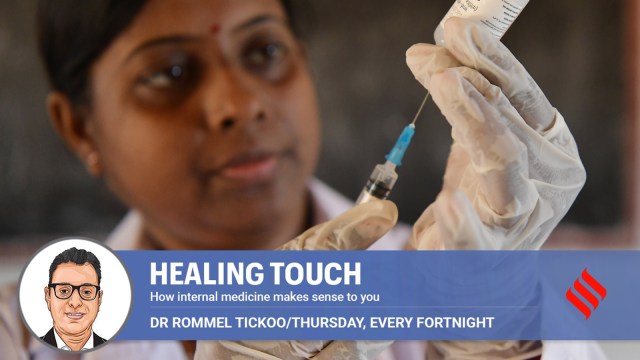Why typhoid fever should be treated early as disease becomes stubborn
Dr Rommel Tickoo, Director, Internal Medicine, Max Super Speciality Hospital, Saket, New Delhi, on gold standard tests and prevention
 As typhoid becomes increasingly drug-resistant, everybody should go for the typhoid conjugate vaccine or TCVs (Express File Photo by Abhisek Saha)
As typhoid becomes increasingly drug-resistant, everybody should go for the typhoid conjugate vaccine or TCVs (Express File Photo by Abhisek Saha)Of late, we are seeing many cases of typhoid in our OPDs, spanning across all age groups. And they are becoming more severe. With all recent conversations around COVID, what we tend to overlook is that the bacteria, Salmonella Typhi, has quickly evolved to become more resistant. So once you have ingested it through contaminated food and water, it spreads and multiplies in the bloodstream in no time.
MULTI-DRUG RESISTANT BACTERIA
Over the last few decades, the typhoid bacteria has developed defences against known and even newer antibiotics. The proportion of typhoid cases that are resistant to one or more antibiotics is increasing globally. Besides, now there’s a new superbug called the extensively drug-resistant (XDR) typhoid, which means that current oral antibiotics may not hold out much longer.
See how fast the trajectory changed. Fluoroquinolone, which was used in the 1990s, has ceased to be effective against typhoid. At least four other drugs have stopped being effective during this period. Now only azithromycin, the oral antibiotic, is effective in treating XDR typhoid patients but even cases resistant to it are now emerging in parts of south Asia. So we are losing out on oral antibiotics and now proceeding towards intravenous antibiotics in advanced, severe cases. That’s why quick diagnosis has become necessary to avoid complications.
WHY YOU SHOULD NOT DELAY TREATMENT
If you have high fever, fatigue, headache, nausea, abdominal pain and constipation or diarrhoea for over 48 hours, then contact a doctor and he should be able to advise you on the right tests to do. Blood culture is the gold standard and the only confirmatory test. Widal tests and other tests like Typhidot are not confirmatory tests and treatment should never be started based on them. The early tests will help the doctors prescribe targetted antibiotics. But most often patients make the mistake of taking general antibiotics which may suppress symptoms but keep the disease festering. Whatever intervention is needed should be done in the first week itself. Or else things could take a turn for the worse in the second week requiring hospitalisation.
HOW TO AVOID FOOD AND WATER CONTAMINATION
Hand hygiene is paramount before you touch anything containing food and water. Wash your hands and scrub them thoroughly before you eat or drink. Avoid ice unless it is made from a safe water source you trust. Carry your own water bottle when you step out of the house. Ensure food is properly cooked and is still hot when served. Avoid raw milk, drink only pasteurized or boiled milk. Wash fruits and vegetables thoroughly and have salads freshly prepared at home. If having them raw, peel their skin. Do not store dressed salad in the refrigerator.
PREVENTION WITH VACCINE
As typhoid becomes increasingly drug-resistant, everybody should go for the typhoid conjugate vaccine or TCVs. These can be given to infants as young as six months and need to be taken once in two years. This vaccine has been found to be 97 per cent effective against XDR typhoid. A phase-3 trial in children aged between nine months and 12 years in Malawi, Africa, has shown that our own conjugate typhoid toxoid vaccine — Typbar — made by Bharat Biotech lasts for at least four years.
Photos




- 01
- 02
- 03
- 04
- 05


























